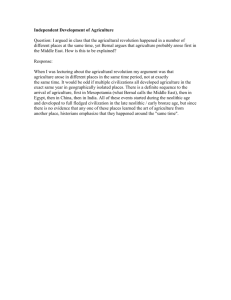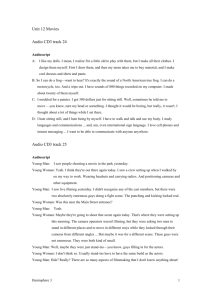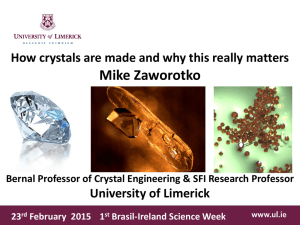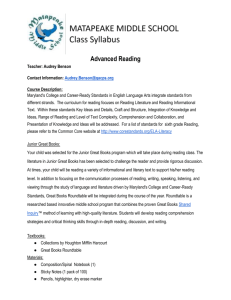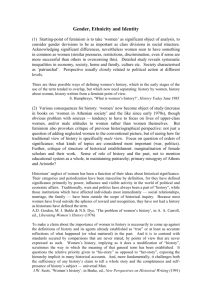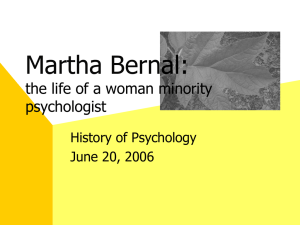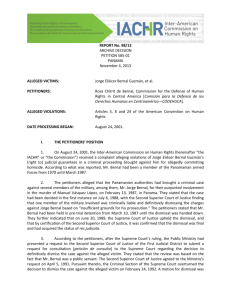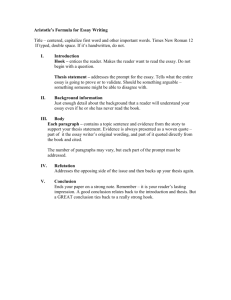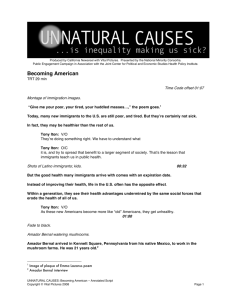Science, Technology & Society Course Syllabus
advertisement
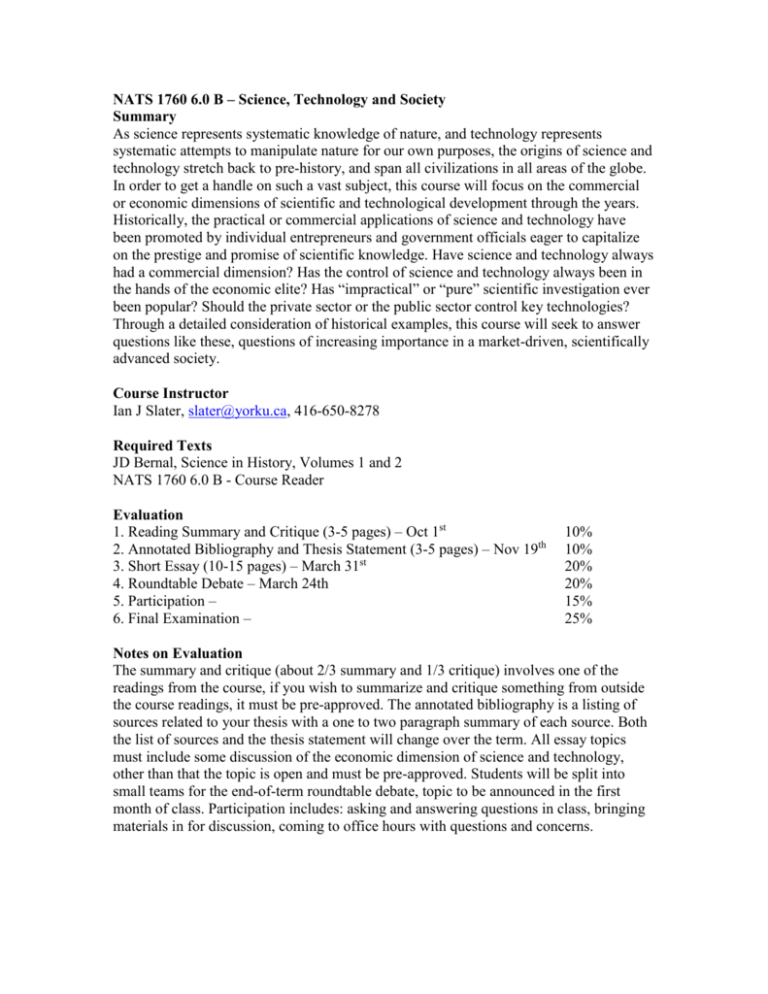
NATS 1760 6.0 B – Science, Technology and Society Summary As science represents systematic knowledge of nature, and technology represents systematic attempts to manipulate nature for our own purposes, the origins of science and technology stretch back to pre-history, and span all civilizations in all areas of the globe. In order to get a handle on such a vast subject, this course will focus on the commercial or economic dimensions of scientific and technological development through the years. Historically, the practical or commercial applications of science and technology have been promoted by individual entrepreneurs and government officials eager to capitalize on the prestige and promise of scientific knowledge. Have science and technology always had a commercial dimension? Has the control of science and technology always been in the hands of the economic elite? Has “impractical” or “pure” scientific investigation ever been popular? Should the private sector or the public sector control key technologies? Through a detailed consideration of historical examples, this course will seek to answer questions like these, questions of increasing importance in a market-driven, scientifically advanced society. Course Instructor Ian J Slater, slater@yorku.ca, 416-650-8278 Required Texts JD Bernal, Science in History, Volumes 1 and 2 NATS 1760 6.0 B - Course Reader Evaluation 1. Reading Summary and Critique (3-5 pages) – Oct 1st 2. Annotated Bibliography and Thesis Statement (3-5 pages) – Nov 19th 3. Short Essay (10-15 pages) – March 31st 4. Roundtable Debate – March 24th 5. Participation – 6. Final Examination – 10% 10% 20% 20% 15% 25% Notes on Evaluation The summary and critique (about 2/3 summary and 1/3 critique) involves one of the readings from the course, if you wish to summarize and critique something from outside the course readings, it must be pre-approved. The annotated bibliography is a listing of sources related to your thesis with a one to two paragraph summary of each source. Both the list of sources and the thesis statement will change over the term. All essay topics must include some discussion of the economic dimension of science and technology, other than that the topic is open and must be pre-approved. Students will be split into small teams for the end-of-term roundtable debate, topic to be announced in the first month of class. Participation includes: asking and answering questions in class, bringing materials in for discussion, coming to office hours with questions and concerns. Notes Students who feel that there are extenuating circumstances which may interfere with the successful completion of the exam or other course requirements are encouraged to discuss the matter with the Course Director as soon as possible. Students with physical, learning or psychiatric disabilities who require reasonable accommodations in teaching style or evaluation methods should discuss this with the Course Director early in the term so that appropriate arrangements can be made. Lectures Lecture: Monday 14:30-17:30, R S205 Lecture: Approximately 1hr, discussion period: approximately ½ hour Office Hours: By Appointment, Bethune 304 Lecture Schedule Lecture 1 –September 10 – Introduction to course Lecture 2 – September 17 – Bernal, Science in History, Volume 1, Chapter 1 – What is Science? – Bernal, Science in History, Volume 1, Chapter 2 – The Old Stone Age Lecture 3 – September 24 – Bernal, Science in History, Volume 1, Chapter 3 – Agriculture and Civilization Lecture 4 – October 1 - Course Reader: James McClellan and Harold Dorn, Science and Technology in World History, Johns Hopkins University Press, 1999, Chapter 6, The Middle Kingdom, pp 117140 - Bernal, Science in History, Volume 1, Chapter 4 – The Iron Age Lecture 5 – October 15 - Course Reader: W TeBrake, “Taming the Waterwolf: Hydraulic Engineering and Water Management in the Netherlands during the Middle Ages”, Technology and Culture, Vol 43, N 3, July 2002 Lecture 6 – October 22 – Bernal, Science in History, Volume 1, Chapter 5 – Science and the Transition to Feudalism Lecture 7 – October 29 – Bernal, Science in History, Volume 1, Chapter 6 – Medieval Science – Essay Workshop – Announcement of topic for roundtable Lecture 8 – November 5 - Course Reader: Jared Diamond, Guns, Germs and Steel: A Short History of Everybody for the last 13,000 Years, Vintage Press, 1998, Chapter 3, Collision at Cajamarca, pp 6782. Lecture 9 – November 12 - Bernal, Science in History, Volume 2, Chapter 7, Sections 7.1-7.5 – The Scientific Revolution, Part 1 Lecture 10 – November 19 – Bernal, Science in History, Volume 2, Chapter 7, Sections 7.6-7.10 – The Scientific Revolution, Part 2 Lecture 11 – November 26 - Course Reader: Toby Huff, The Rise of Early Modern Science: Islam, China and the West, Cambridge University Press, 1999, Chapter 6, Cultural Climates and the Ethos of Science, pp 202-236 Lecture 12 – December 3 - - Harold J Cook, Matters of Exchange: Commerce, Medicine, and Science in the Dutch Golden Age, Yale University Press, 2007, Chapter 1, Worldly Goods and the Transformation of Objectivity, pp 1-43 Roundtable preparation session Lecture 13 – January 7 – Bernal, Science in History, Volume 2, Chapter 8 – Antecedents and Consequences of the Industrial Revolution Lecture 14 – January 14 – Bernal, Science in History, Volume 2, Chapter 9 – Scientific Developments in the 18th and 19th Centuries Lecture 15 – January 21 - Margaret C. Jacob and Larry Stewart, Practical Matter: Newton’s Science in the Service of Industry and Empire 1687-1851, Harvard University Press, 2004, Chapter 5, Putting Science to Work: European Strategies, 199-154 Lecture 16 – January 28 - K. Maria D. Lane, “Geographers of Mars: Cartographic Inscription and Exploration Narrative in the Late Victorian Representations of the Red Planet”, ISIS, Vol 96, N 4, December 2005, pp 477-506 Lecture 17 – February 4 - David F. Noble, America By Design: Science, Technology and the Rise of Corporate Capitalism, Oxford University Press, 1977, Chapter 1, The Wedding of Science to the Useful Arts – 1 – The Rise of Science Based Industry, pp 3-19. Lecture 18 - February 18 - David A Kirsch, The Electric Vehicle and the Burden of History, Rutgers University Press, 2000, Chapter 6, The Burden of History: Expectations Past and Imperfect, pp 195208 Lecture 19 – February 25 - Newton H Copp and Andrew W Zanella, Discovery, Innovation and Risk, Case Studies in Science and Technology, MIT Press, 1993, Chapter 6, Gasoline: From Waste Product to Fuel, pp 146-191 Lecture 20 – March 3 - Michael J Neufeld, The Rocket and the Reich: Peenemünde and the Coming of the Ballistic Missile Era, Harvard University Press, 1995, Chapter 1, The Birth of a Missile, pp 5-40 Lecture 21 – March 10 - Matthew J Bellamy, Profiting the Crown: Canada’s Polymer Corporation, 1942-1990, McGill-Queens University Press, 2005, Chapter 3, For the Country at War and the Country at Peace, 1945-1951, pp 57-86. Lecture 22 – March 17 - Gabrielle Hecht, The Radiance of France: Nuclear Power and National Identity after World War II, MIT Press 1998, Chapter 2, Technopolitical Regimes, pp 55-90 Lecture 23 – March 24 - Roundtable Debate Lecture 24 - March 31 - Exam Review
